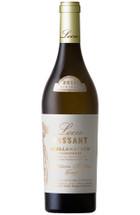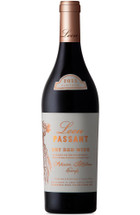- Home
- Wines
- South Africa
- Leeu Passant Winery, Franschhoek
- Leeu Passant Red Blend 2016
Product Notes
37.5% Cabernet Sauvignon, 37.5% Cabernet Franc, 25% Cinsault
An adventure into Cape wine heritage by Chris & Andrea Mullineux and Analjit Singh.
Tasting notes:
'A tribute to the Cape red blends of old (those that didn’t include Pinotage), this is an almost equal amalgam of Cabernet Sauvignon, Cabernet Franc and Cinsault. Made with 100% whole bunches, it’s another triumphant release from the Mullineux. Cassis and raspberry fruit flavours are supported by acidity and fine tannins with top notes of tobacco and Earl Grey tea. 2020-30.' – Tim Atkin MW, SA Special Report 2018, 95/100
'The 2016 Leeu Passant Dry Red is Chris and Andrea Mullineaux’s take on 1950s and 1960s Cape red wine and utilizes fruit from vines planted as far back as 1900, with 25% whole clusters including around one-third Cabernet Franc, Cinsault and Cabernet Sauvignon. It was matured for 18 months in 225-liter French oak barrels, 30% new. This works very successfully on the nose of perfumed dark berry fruit laced with cedar and tobacco, not a million miles away from an old-school Claret. The palate is medium-bodied with grainy tannin, a fine bead of acidity, plenty of tar- and tobacco-infused black fruit and a slightly austere but very well balanced finish. Excellent.' – Neal Martin Report 2018, 92/100
Partial whole-bunch fermentation before maturation lasting 16 months in 500-litre barrels, 30% new. Red cherry, dried herbs and tobacco plus a hint of vanilla on the nose. The palate is pure and fresh, while the tannins are particularly grippy, the wine appearing a little unknit compared to how the 2015 showed on release. Taken as a whole, it’s again immensely appealing and an important sign post as to the direction that modern SA red might take. Alc: 14%.' – Christian Eedes, Winemag, 93/100
'This beautifully refined and elegant wine has notes of bergamot a dark violet fragrance. fragrance. The palate is structured, with fine chalky tannins, hints of spices and fragrance.The finish is dry, vibrant, layered and long. Best served at 16 - 18 °C, this wine will greatly benefit from decanting if drunk within the first 3 to 5 years after bottling and will reward if cellared properly over the next few decades.' – Winemaker
Winemakers notes:
'These multi-regional fine wines, incorporating several very special and old (up to 118 years old) vineyards, continue to celebrate the rich history of South African wine, having been inspired by the age worthy Cape red wines of the 1950’s, 1960’s and 1970’s. We have deconstructed and reconstructed these wines, making Leeu Passant in a modern, minimalist way and a no-compromise approach to quality, while respecting the history and tradition of Cape Wine. Whereas the 2015 wines were all about tightly coiled freshness and structure the 2016s have more body to go with the structure, reflecting the drier vintage conditions.'
Vinification:
From one parcel of 37 year old dry farmed bush vine Cabernet Sauvignon planted in deep alluvial soils of Stellenbosch; one 116 year old dry farmed bush vine Cinsault vineyard (South Africa's oldest registered Red Wine Vineyard) planted in deep sandy alluvial soils in Wellington; one parcel of 94 year old (SA's 2nd oldest registered Red Wine Vineyard) dry farmed bush vine Cinsault planted on the lower eastern slopes of Franschhoek mountains; and a parcel of high altitude Cabernet Franc planted on the mid slopes of the Helderberg mountain in Stellenbosch.
Viticulture:
Grapes are cooled in our cold room, then destemmed put into tank with up to 50% whole clusters added to the Cinsault and Cabernet Franc. Minimal sulphur is added, and no further additions are made. The must is initially pigeaged once a day. After about 4 days fermentation begins without inoculation and the wine is pigeaged twice a day. Temperatures are not allowed to exceed 28°C. Fermentation lasts 7 to 10 days. After fermentation, a couple of weeks' skin contact is given and the wine is then drained and pressed to barrel. The wines are racked and blended mid-way through the year, and bottled after 16 months in barrel.
Analysis:
Alc: 14% RS: 2.6 g/L TA: 5.1 g/L pH: 3.73
 Loading... Please wait...
Loading... Please wait...























